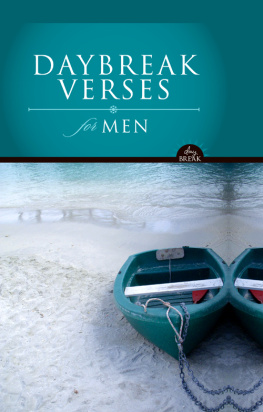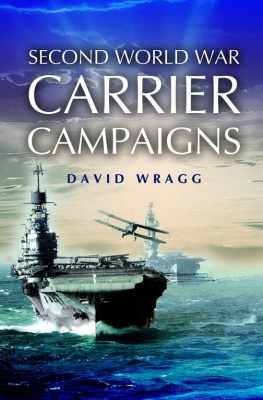
This edition is published by ESCHENBURG PRESS www.pp-publishing.com
To join our mailing list for new titles or for issues with our books eschenburgpress@gmail.com
Or on Facebook
Text originally published in 1944 under the same title.
Eschenburg Press 2017, all rights reserved. No part of this publication may be reproduced, stored in a retrieval system or transmitted by any means, electrical, mechanical or otherwise without the written permission of the copyright holder.
Publishers Note
Although in most cases we have retained the Authors original spelling and grammar to authentically reproduce the work of the Author and the original intent of such material, some additional notes and clarifications have been added for the modern readers benefit.
We have also made every effort to include all maps and illustrations of the original edition the limitations of formatting do not allow of including larger maps, we will upload as many of these maps as possible.
DAYBREAK FOR OUR CARRIER
by
Lt. Com. MAX MILLER
United States Naval Reserve
TABLE OF CONTENTS
Contents
TABLE OF CONTENTS
1
ON GOOD days, on days when everything is going just right aboard, and when the planes are taking off within their few second intervalson those days a carrier sings. She is a symphony of engine thunder and colored signals. She is a ballet almost.
There are the had days too. These are the days of discord. They are the days when the planes for no apparent reason start getting fouled on the flight deck or while being brought aloft from the hangar deck, or the elevators get blocked, or this or that, and nobody knows exactly the reason.
So if one were to describe an aircraft carrier accurately he should not be too grim about her or too overly concerned with where she has been or what she has done. Such notes may be all right so far as they go, but they do not go into the heart of the carrier herself.
A carrier can be so many things at once, all at once, that her very bulk and variety place her outside the realm of all other vessels we have come to know through the ages. Literature and romance already have classified Phoenician galleys, and have carried the classification on through square-riggers, through clippers, through the first side-wheelers, and on to liners and battleships.
But now comes a vessel so immense that her arms reach hundreds of miles from her body. The air is as much her realm as the sea. Clouds are as important to her as depth or current. She is, in brief, a sort of fourth-dimensional creation. She is both bird and barque. She is a new thing .
2
THIS vessel is a piece of the United States.
She became detached somehow from the mainland of America, and was speeded out here. She is a piece of the best of the United States. She is out here to help offset the shortage of landing fields in this mid-Pacific. She is a movable base zigzagging between our own coasts and the coasts of the cunning enemy.
Islands cannot be made to float, it is said. But here is an American-made island, and her speed can be pushed if need be to well above thirty knots. We are all a part of her, as she is a part of the United States. Copper from Montana is in her. Steel from Pennsylvania is in her. Lumber from the mountains of Washington and from Michigan and from Minnesota is in her, too. A state cannot be named which is not represented in her somehow. The men aboard are from all these states likewise.
We are not lonely on this carrier, for we have brought our homeland with us. We have extended our homeland to out here beyond the date-line. We speed along ever westward for a coming engagement.
Exactly what turn the engagement may take, we do not know. What may be waiting for us there in ambush, we do not know either. But we have our own opinions, and we have our scuttlebutt. And we know, too, that on this attack we are going deep into the enemys own front yard. This we know, for it has been told to us. It was told to us on the second day out.
We had had our guesses, of course, as to where we were going, and these guesses had proved rather accurate. They usually do. But during that lecture in the wardroom, and while facing charts and diagrams, it had been fun pretending we were surprised.
The statement that we are not lonely may be assuming too much. It means we are not lonely in the sense of being Americans on foreign territory. This is our own territory, and our flight deck is almost the size of a homeland meadow. At least the flight deck is well over the size of a city block. Men on the stern appear tiny indeed from the bow. There is no recognizing them from such a distance. Nor will voices carry that far except through the ships loud-speakers.
In the staterooms are the pictures of American women, of American girls, of American children, and of American babies. It is obvious that some of the young husbands aboard have not seen their own new babies except through these pictures. And some, especially the pilots and their gunners, may never see their babies at all.
But it is best not to think of that.
It is best for us instead to make this ship the fightingest ship there is, and to keep her that way. This is the trust of all those aboard. Nothing must happen to her. The flyers and their gunners are loaned to the air, so to speak, but they are still attached to us regardless of how far they go. These decks, this piece of America, comprise the flyers lifeline, their home, their sanctuaryand their ammunition depot.
And each time the flyers land aboard, when they climb down from their cockpits, when they remove their paraphernalia, its like overhearing a splendid prayer to overhear them say: Hot damn.
3
A CARRIER may be a temporary innovation. Who is to know about that? Who is to know about the day after tomorrow; as measured by years, as measured by wars?
It may be that carriers will have served their purpose with this immediate era. After this war they may become museum pieces. Or relics. Something to be stared at on a Sunday afternoon by crowds curious to see a floating left-over of history. Planes may be so big then, and so fast, and with such great cruising ranges, that these subsidiary landing fields, these carriers, may be inessential.
But if future generations do stare on a Sunday afternoon at some preserved carrier, a hold-over from these Pacific days, the staring had best be performed with reverence. For what a purpose these carriers already have served to the nation! At least out here on the Pacific where, because of fabulous distances, carriers are so necessary.
But we aboard are not much concerned with such thoughts of the future. We havent time for that. We are too busy preparing for this next engagement, too busy checking the shells and the bombs. Its quite a lift from the pit of this ship, from the bomb magazines, up to the flight deck, up to where each torpedo-bomber or each dive-bomber receives its quota, for daily practice or for keeps.
There is so much else to do too, and to keep doing, that this carrier herself, as she speeds along, seems untouched by all the arguments which have taken place ashore about her and her kind during past years. She is above all that. Her own action speaks her worth. Her own need, as she plows westward, speaks it too.












